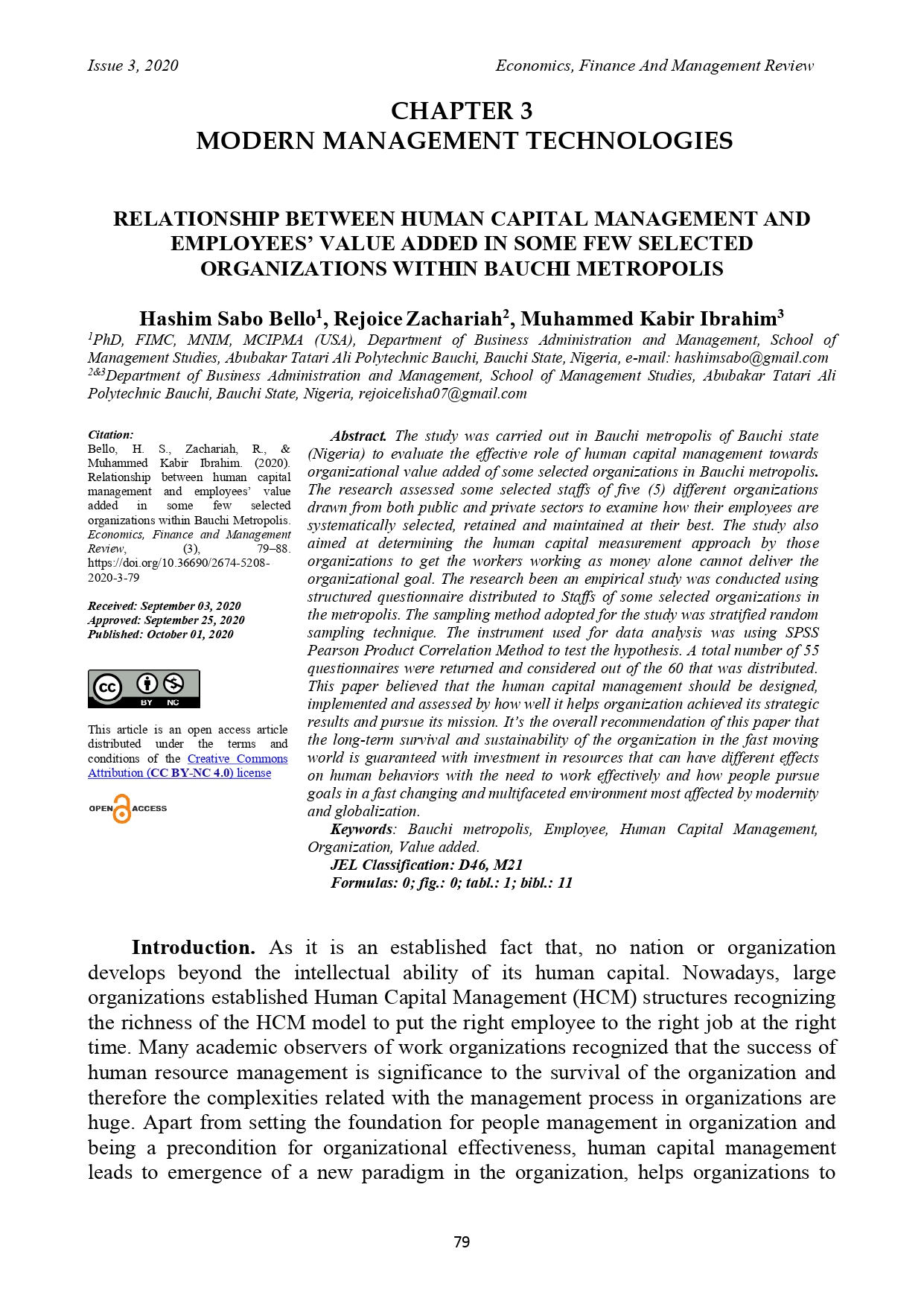RELATIONSHIP BETWEEN HUMAN CAPITAL MANAGEMENT AND EMPLOYEES’ VALUE ADDED IN SOME FEW SELECTED ORGANIZATIONS WITHIN BAUCHI METROPOLIS
DOI:
https://doi.org/10.36690/2674-5208-2020-3-79Keywords:
Bauchi metropolis, Employee, Human Capital Management, Organization, Value addedAbstract
The study was carried out in Bauchi metropolis of Bauchi state (Nigeria) to evaluate the effective role of human capital management towards organizational value added of some selected organizations in Bauchi metropolis. The research assessed some selected staffs of five (5) different organizations drawn from both public and private sectors to examine how their employees are systematically selected, retained and maintained at their best. The study also aimed at determining the human capital measurement approach by those organizations to get the workers working as money alone cannot deliver the organizational goal. The research been an empirical study was conducted using structured questionnaire distributed to Staffs of some selected organizations in the metropolis. The sampling method adopted for the study was stratified random sampling technique. The instrument used for data analysis was using SPSS Pearson Product Correlation Method to test the hypothesis. A total number of 55 questionnaires were returned and considered out of the 60 that was distributed. This paper believed that the human capital management should be designed, implemented and assessed by how well it help organization achieved its strategic results and pursue its mission. It’s the overall recommendation of this paper that the long-term survival and sustainability of the organization in the fast moving world is guaranteed with investment in resources that can have different effects on human behaviors with the need to work effectively and how people pursue goals in a fast changing and multifaceted environment most affected by modernity and globalization.
Downloads
References
Accounting for People Task Force (2003) Accounting for People. London: DTI.
Adaba, T. (2006). Bauchi State: A Historical Perspective. Abuja: Trim Communication Limited.
Asiabaka, I.P., and Odionye, E.A. (2010). National Universities Commission (NUC) Minimum academic standard: Implication for quality teacher education programmes in Nigeria. Nigerian Journal of Professional Teachers. 1(6), 104-118.
Baron, A and Armstrong, M (2007) Human Capital Management: Achieving added value through people. London: Kogan Page.
Bontis, N, Dragonetti, N C, Jacobsen, K and Roos, G (1999). The knowledge toolbox: a review of the tools available to measure and manage intangible resources, European Management Journal, 17 (4), pp 391–402.
CFO Research Services (2003) Human Capital Management: The CFO’s perspective, Boston, MA: CFO Publishing.
Davenport, T O (1999). Human Capital. San Francisco, CA: Jossey-Bass.
Edvinson, L and Malone, M S (1997). Intellectual Capital: Realizing your company’s true value by finding its hidden brainpower. New York: Harper Business.
Hartley, V (2005) Open for Business: HR and human capital reporting, Brighton, IES.
Ibrahim, S.A. (2012). Vocational and Technical Education, Job Creation and National Security. Proceedings of the 2nd National Conference of School of Vocational and Technical Education. College of Education Azare, Bauchi State, Nigeria. Held between 5th - 8th June.
Ivowi, U.M.O. (2006). Programmes of Tertiary Institutions: Relevance and Adequacy in Higher Education in Nigeria, Aghenta (ed.). Lagos: The Nigerian Academy of Education.
Kearns, P (2005). Evaluating the ROI from Learning. London: CIPD.
Kothari, C.R (1992). An introduction to operational Research. New Delhi: Vikas..
Mayo, A (2001). The Human Value of the Enterprise: Valuing people as assets. London: Nicholas Brealey.
Nalbantian, R, Guzzo, R A, Kieffer, D and Doherty, J (2004) Play to Your Strengths: Managing your internal labour markets for lasting competitive advantage. New York: McGraw- Hill.
Putnam, R D (1996). The strange disappearance of civic America. The American Prospect, Winter, pp 34–48.
Scarborough, H and Elias, J (2002). Evaluating Human Capital. London: CIPD.
Schultz, T W (1961). Investment in human capital. American Economic Review, 51, March, pp 1–17.
Schultz, T W (1981). Investing in People: The economics of population quality. Los Angeles CA: University of California Press.
Watson Wyatt Worldwide (2002) Human Capital Index: Human capital as a lead indicator of shareholder value. Washington, DC: Watson Wyatt Worldwide.
Wright, P M and McMahan, G C (2011). Exploring human capital: putting human back into strategic human resource management. Human Resource Management Journal, 21 (2), pp. 93–104.
Youndt, M A (2000). Human resource considerations and value creation: the mediating role of intellectual capital. Paper delivered at National Conference of US Academy of Management, Toronto, August.

Downloads
Published
How to Cite
Issue
Section
License

This work is licensed under a Creative Commons Attribution-NonCommercial 4.0 International License.








